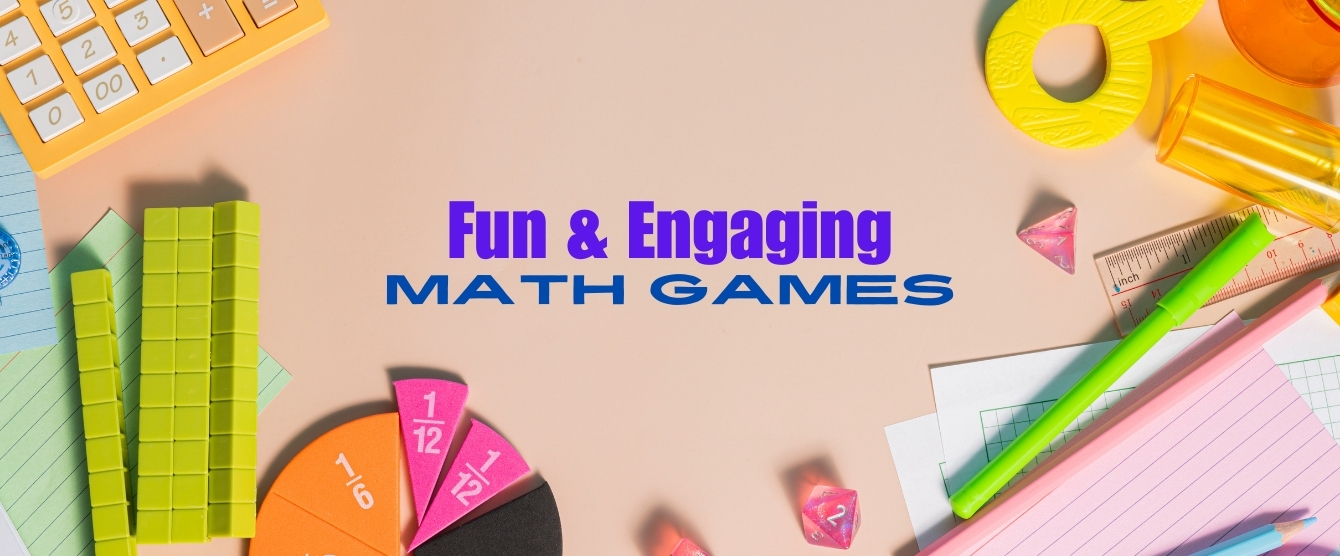Math games are more than just a way to keep children entertained. They are powerful educational tools that help reinforce math concepts in a practical and enjoyable manner. When children engage in math games, they are not only learning but also applying mathematical principles without realizing it. This makes the learning process more organic and less intimidating. Incorporating math games into your homeschooling curriculum can help reduce the stress and frustration often associated with traditional math exercises. By turning lessons into play, you create an environment where children are more willing to participate, experiment, and make mistakes—key components of effective learning.
Homeschooling offers a unique opportunity to tailor your child’s education to their specific needs and interests. However, teaching math can sometimes be challenging. If you’ve been wondering how to teach math to children in a way that captures their interest and makes learning enjoyable, you’ve come to the right place. This blog post explores a range of fun and engaging math games that will transform your homeschooling experience and turn math lessons into a joyful adventure.
The Benefits Of Integrating Math Games & Choosing The Right Math Games
One of the main benefits of using math games in homeschooling is that they cater to different learning styles. Visual learners benefit from seeing math concepts in action, while kinesthetic learners thrive on the hands-on experience that games provide. Auditory learners can also benefit when games involve discussions or explanations of strategies. Another significant advantage is that math games can help improve problem-solving skills. They often require children to think critically and develop strategies to win, which translates to better analytical skills in other areas of learning. Additionally, math games can foster a love for math by showing children that math can be fun and interesting rather than just a series of abstract concepts.
When selecting math games for your homeschool curriculum, consider your child’s interests and current math level. The goal is to find games that are challenging enough to stimulate learning but not so difficult that they become frustrating. Look for games that cover a range of math concepts, from basic arithmetic to more advanced topics like geometry and algebra. Board games, card games, and online games all have their place in a well-rounded math curriculum. Each type of game offers different benefits and can be used to teach various concepts. For instance, board games are great for family learning sessions, while online games can provide interactive and individualized practice.
Classic Board Games, Card Games, Online Games, & DIY Math Games
Board games are a fantastic way to teach math concepts while having fun as a family. Games like Monopoly teach basic arithmetic, budgeting, and financial decision-making. By handling money, making purchases, and paying rent, children practice addition, subtraction, and even some multiplication and division. Another excellent board game is “The Game of Life.” This game introduces children to budgeting, planning, and probability. It helps them understand the consequences of their financial decisions, all while practicing basic math skills. Additionally, “Yahtzee” is a classic dice game that reinforces addition and probability.
Card games are portable, easy to set up, and offer endless possibilities for math practice. A simple deck of cards can be used to play a variety of math games that improve number recognition, addition, subtraction, and multiplication skills. One popular card game is “Math War.” In this game, players split a deck of cards and flip them over simultaneously. The player with the highest card wins both cards. To add a math twist, you can change the rules so that players must add, subtract, or multiply the numbers on the cards before determining the winner. “21” is another fun card game that doubles as a math lesson. Players draw cards with the goal of reaching a sum as close to 21 as possible without going over. This game helps children practice addition and develop strategic thinking skills as they decide whether to draw another card or stay with their current total.
There are numerous online platforms that offer interactive math games designed to make learning fun and engaging. Websites like Coolmath Games, Khan Academy, and ABCmouse offer a wide range of games that cover various math concepts and skills. Online games are particularly useful because they provide instant feedback, allowing children to see their mistakes and correct them immediately. This real-time feedback helps reinforce learning and build confidence. Additionally, many online games are adaptive, meaning they adjust the difficulty level based on the child’s performance, ensuring that the games remain challenging but not frustrating.
Creating your own math games is a wonderful way to tailor activities to your child’s interests and learning level. DIY games can be as simple or as complex as you like, and they often require minimal materials. One easy DIY game is “Math Bingo.” Create bingo cards with math problems in each square. Call out the answers, and have your child mark the corresponding problem on their card. This game can be adapted to practice any math skill, from basic addition to more advanced algebraic equations. Another fun DIY game is “Number Hunt.” Write numbers on sticky notes and hide them around the house. Give your child math problems to solve, with the answers corresponding to the numbers you’ve hidden. This game combines physical activity with math practice, making it perfect for kinesthetic learners.
Sometimes, the best math lessons happen outside of structured learning time. Look for opportunities to incorporate math into your child’s daily activities. Cooking, for example, is a fantastic way to practice measurement, fractions, and ratios. Involve your child in measuring ingredients, adjusting recipes, and timing cooking processes. Shopping trips also provide excellent math practice. Have your child help with budgeting, calculating discounts, and comparing prices. These real-world applications of math help children understand the relevance of math in everyday life and reinforce the skills they learn during formal lessons.
Educational Math Apps, Group Math Games, & Gamifying Math Lessons
For busy homeschool families, educational math apps offer a convenient way to practice math skills on the go. Apps like Prodigy, SplashLearn, and Mathletics provide engaging math games that can be played on a tablet or smartphone. These apps often include reward systems, such as earning points or badges, which motivate children to keep practicing. They also track progress, allowing parents to see areas where their child excels and where they may need additional practice. Educational math apps are a great way to make the most of downtime, such as during car rides or waiting for appointments.
Homeschooling doesn’t have to be a solitary endeavor. Organize group math games with other homeschooling families to provide social interaction and collaborative learning opportunities. Group games can include math relay races, math scavenger hunts, and math-themed trivia contests. Playing math games with peers encourages teamwork, communication, and healthy competition. It also allows children to see different problem-solving strategies and learn from one another. Group math games can be a regular part of your homeschool routine or a special event to look forward to.
Gamification involves incorporating game-like elements into non-game activities, and it’s a powerful tool for making math lessons more engaging. Create a points system where children earn points for completing math problems, participating in discussions, and helping others. These points can be redeemed for rewards, such as extra screen time or a special treat. You can also set up a leaderboard to track progress and encourage friendly competition. Gamifying math lessons adds an element of excitement and motivation, making children more eager to participate and learn.
Story-Based Math Games For Creative Learning & Using Manipulatives To Enhance Understanding
Story-based math games combine storytelling with math practice, making learning more imaginative and fun. Create math problems that fit into a story, such as a treasure hunt where solving math puzzles leads to the next clue. This approach helps children see math as part of a larger narrative, making it more relatable and engaging. You can also use storybooks that incorporate math concepts, such as “The Grapes of Math” by Greg Tang or “Math Curse” by Jon Scieszka. Reading these books together and discussing the math problems in the story helps reinforce learning in a creative and enjoyable way.
Manipulatives are physical objects that help children visualize and understand math concepts. Common manipulatives include counting blocks, geometric shapes, and fraction tiles. Using manipulatives during math games and lessons provides a hands-on learning experience that enhances comprehension. For example, use counting blocks to demonstrate addition and subtraction or fraction tiles to illustrate how fractions work. Manipulatives can also be homemade, such as using buttons or beads for counting and sorting activities. Incorporating manipulatives into your math games makes abstract concepts more concrete and easier to grasp.
Teaching math to children doesn’t have to be a daunting task. By incorporating fun and engaging math games into your homeschool curriculum, you can make learning math an enjoyable and rewarding experience. From classic board games to DIY activities, there are countless ways to bring math to life and help your child develop a love for the subject. Remember, the goal is not just to teach math concepts but to show children how math is relevant and useful in their everyday lives. By making math playful and interactive, you can foster a positive attitude towards learning and set your child up for success. Ready to take your homeschooling to the next level? Explore these math games with your child and watch as their confidence and skills grow. Happy homeschooling!



